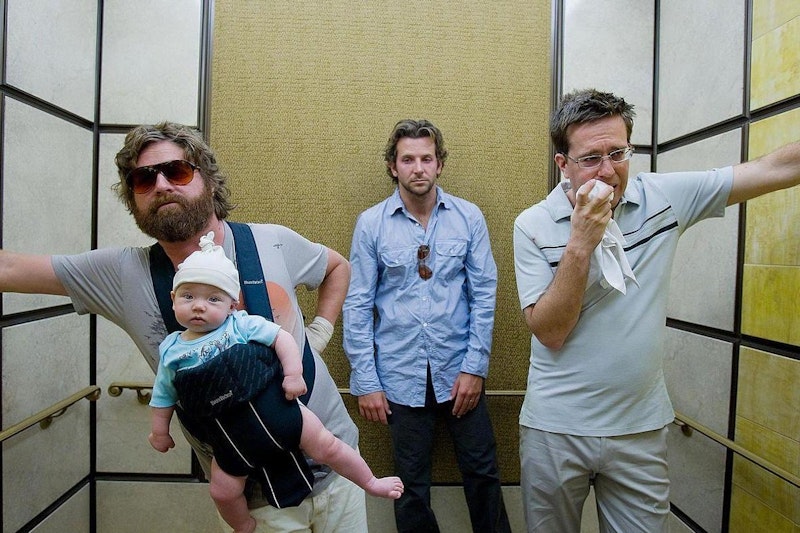If the line between our current sociopolitical climate can be clearly drawn between 2013 and 2014, the point at which the studio comedy disappeared is harder to trace. Although the total disappearance of archetypes like the arrogant macho pussy hound, the cuckolded nerdy guy, and the loser coded as gay and/or “retarded” occurred only a decade ago, the abundance of improvisation and anti-climactic set pieces came straight from Judd Apatow. The 40-Year-Old Virgin was a hit in 2005, an otherwise fallow year for American studio comedies, and Apatow’s films, along with those he produced and “presented”—Knocked Up, Funny People, Superbad, Pineapple Express, This is 40, This is the End—have defined comedies ever since. I think his spell is broken, but long gone are the air-tight scripts of early-2000s comedies like Dude, Where’s My Car?, Little Nicky, Zoolander, Death to Smoochy, and Monkeybone, to name a few.
Maybe that’s why The Hangover was so refreshing in the summer of 2009—the tropes were back! Bradley Cooper was the arrogant macho pussy hound in the role that made him a star, Ed Helms was the cuckolded nerdy guy with an ugly’d up battle-axe wife, and Zach Galifianakis is the loser friend that’s coded as gay and/or “retarded.” The sequels, like most comedy sequels, are terrible, but Todd Phillips’ 2009 film does stand up as one of the better major American comedies of its era, along with another outlier, the far superior The House Bunny from 2008. Both have tight scripts and attitudes that would feel shockingly regressive only a few years later. Both movies still operate on a number of shared premises that were erased in Hollywood 10 years ago, types of guys, types of girls, attitudes about non-white people that would get you fired from Staples today.
Bryan Callen plays a …Persian?… chapel owner in Las Vegas, and although Callen is Lebanese, his performance is full-on mall kiosk salesman, but then again, God, what does any of this matter? If the guy doesn’t have to put paint on his face to play the part, what’s the problem? The voice? The humorous foreigner cannot exist in our current cinema—this is neither good nor bad, but worth pointing out, since this was a familiar character in movies for about a century. Ditto for all the variations on the men and their wives, who are thoroughly mainstream and normative, and although the movie has no glaring problems—like the transgender villains in Dude, Where’s My Car?—it’s from another era entirely, and it even felt that way in 2009.
I saw The Hangover at the Towson Commons 8 on the night it opened with my best friend Jack and his dad. Neither liked the movie as much as I did, which I saw at least once more in theaters. Lines like “Paging Dr. Faggot!” from the male lead are from another era, along with their reaction to female nudity, all googly eyes and pratfalls. Heather Graham is an escort instead of an actress here, but she serves the same purpose as she did in 1999’s Bowfinger: comic, sexual relief, eye candy in a movie about boys being boys. Even by the end of the 2000s, this kind of male camaraderie was becoming less common, and the omnipresence of the “bachelor party” in movies and television diminished—what millennial could afford one? Bachelorette parties are a different story, with films like Girls’ Trip, Bridesmaids, and Bad Moms proving that this kind of anarchic comedy is only allowed for women right now. Boys have to play nice for a bit until we can all figure everything out.
—Follow Nicky Smith on Twitter: @nickyotissmith

